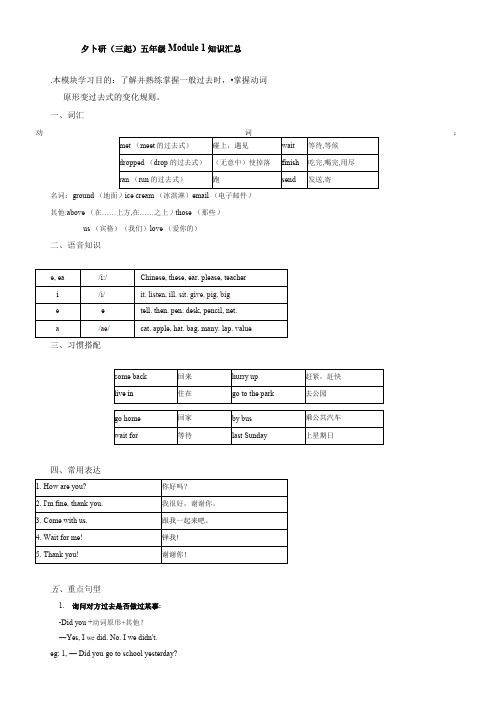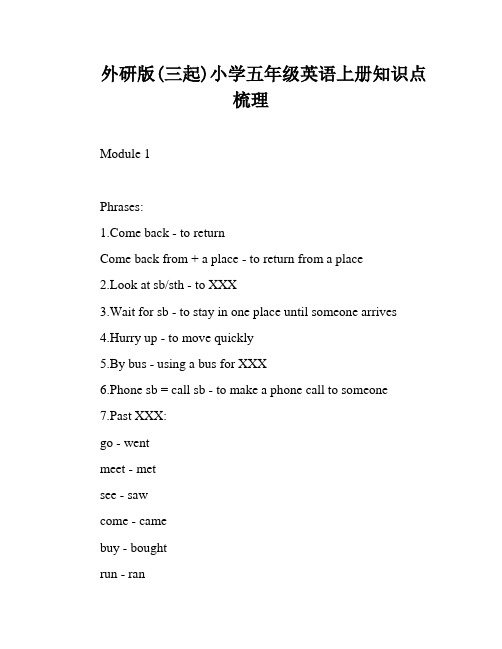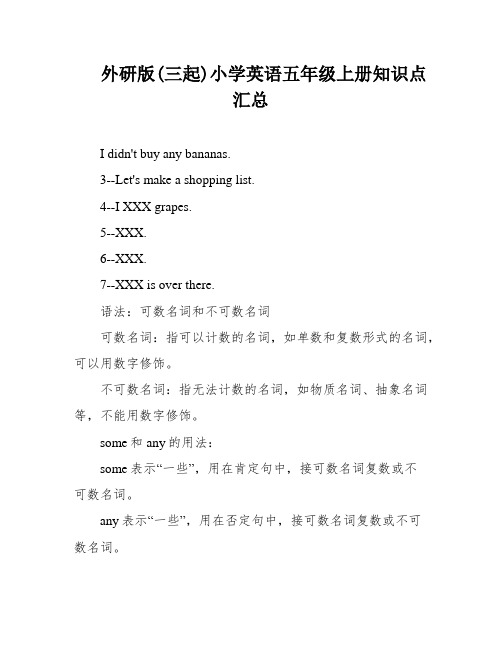外研版(三起)小学五年级英语上册知识点梳理
小学英语五年级上册课本知识点(外研版三年级起点)

小学英语五年级上册课本知识点(外研版三年级起点)小学英语五年级上册课本知识点(外研版三年级起点)Module 11、动词过去式meet-met、run-ran、drop-dropped(双写)2、from above the ground:“从地面上方”,above“在…上方(不接触)”,on“在…上(接触)”eg:The bridge(桥) is above the river(河). The book is on the desk.3、those“那些”,后接可数名词复数4、Let’s:“让我们”(1)let’s=let us,’s是us的缩写不是is的缩写,us是we的宾格(2)let sb do sth“让某人做某事”,如Let me buy some ice creams.5、wait“等待”,wait for sb“等待某人”,如Wait for me!6、hurry“赶紧”,Hurry up!“快点!”7、send“发送”,过去式为sent,send you an email“给你发一封电子邮件”复习:8、动词过去式:go-went、see-saw、buy-bought、come-came9、be back=come back“回来”,如I was back from China yesterday.=I came back from China yesterday.10、walk to school“走路去上学”(1)同义句go to school on foot(2)其他方式:go to+地点by bus/bike/plane/train/car11、Here+be名词“这有…”,be的单复数有后面的名词决定,如Here is a book. Here are two books.12、A and B’s+单数名词“A和B共同的…”,如Sam andAmy’s friend13、短语:last Sunday“上周日”、live in London“住在伦敦”、look at“看”、come with us“跟我们一起来”、a postcard from Lingling“来自玲玲的一张明信片”、It’s for you“它是给你的”Module 21、need“需要”,如We need food for our picnic.2、list“清单”,3、can“能、可以”(1)后接动词原形,无单复数变化,如We can buy four apples. He can buy four apples.(2)变否定can not=can’t,变问句can提前4、How much+不可数名词,提问不可数名词的数量,如How much cheese did you buy?How many+名词复数,提问可数名词的数量,如How many apples did you buy?5、some用于肯定句,any用于否定和疑问句eg:We bought some bananas. We didn’t buy any bananas. Did you buy any bananas?6、over there“在那边”7、half“一半”,half a kilo半千克8、a lot of=lots of“许多”,后面可以接可数名词复数,也可以接不可数名词复习:8、动词过去式:eat-ate、lose-lost9、短语:at the supermarket“在超市”。
外研版三年级起点五年级上册知识点

外研版三年级起点五年级上册知识点一、单词。
1. 描述人物的单词。
- old(年老的),young(年轻的),funny(滑稽的;可笑的),kind(体贴的;慈祥的;宽容的),strict(要求严格的;严厉的)。
- 例如:My grandma is old.(我的奶奶年老了。
)- My English teacher is strict.(我的英语老师很严格。
)2. 星期单词。
- Monday(星期一),Tuesday(星期二),Wednesday(星期三),Thursday (星期四),Friday(星期五),Saturday(星期六),Sunday(星期日)。
- 注意首字母大写。
例如:We have English on Monday.(我们星期一有英语课。
)3. 食物单词。
- sandwich(三明治),salad(蔬菜沙拉;混合沙拉),hamburger(汉堡包),ice cream(冰淇淋),tea(茶;茶水)。
- I like sandwiches.(我喜欢三明治。
)- She doesn't like ice cream.(她不喜欢冰淇淋。
)4. 学科单词。
- English(英语),maths(数学),Chinese(语文),science(科学),PE (体育),music(音乐),art(美术)。
- We have science and art on Tuesday.(我们星期二有科学和美术课。
)二、短语。
1. 描述人物的短语。
- be helpful(有用的;愿意帮忙的),be hard - working(工作努力的;辛勤的)。
- He is helpful at home.(他在家很乐于助人。
)- My sister is hard - working.(我的姐姐很勤奋。
)2. 与学校活动相关的短语。
- have classes(上课),do homework(做作业),read books(读书),play sports(做体育运动)。
外研版(三起)英语五年级上册重点知识汇总

夕卜研(三起)五年级Module 1知识汇总.本模块学习目的:了解并熟练掌握一般过去时,•掌握动词原形变过去式的变化规则。
一、词汇动:名词:ground (地面)ice cream (冰淇淋)email (电子邮件)其他:above (在……上方,在……之上)those (那些)us (宾格)(我们)love (爱你的)二、语音知识三、习惯搭配四、常用表达五、重点句型1.询问对方过去是否做过某事:-Did you +动词原形+其他?―Yes, I we did. No. I we didn't.eg: 1, — Did you go to school yesterday?-Yes. I did.2.—Did you see a film last night?―No. we didn't.2. 描述某人过去做过某事:主语+动词过去式+其他.eg: 1.1 met my English teacher yesterday.2. Bob lost his pet dog last Friday.一、词汇动词:need (需要)lost (丢失)(lose的过去式)use (使用)其他:list (清单)er (哦,嗯,呃)can (可以)cheese (奶酪) first (首先,第一;最先的,第一(次)的)half (一半) any (一些,一点,若干)bottle (瓶子;一瓶的容量)kilo (干克)二、语音知识四、常用表达I don't know, 我不知道。
五、重点句型1.如何询问物品的数量:①How much + 不可数名词+ do you have?②How many +可数名词复数+ do you have?2.一般过去时的特殊疑问句句型:一特殊疑问词+did+主语+动词原形+其他,一主语+动词的过去式+其他.eg: 1, —What did you do last Friday?—I did my homework.2.—How much milk did you buy?—I bought a bottle of milk.—、词汇1.weekend 周末2. place 地方3.British英国的,英国人的;英国人4.museum博物馆5. how如果,怎样6. best最7.took (take的过去式)搭乘,乘坐(交通工具);二、语音知识四、重点句型1.-Where did you go? -I / We went (to ) + 地点.eg: -Where did you go? -We went to the British Museum.2.某人+ took a photo of + 他人.eg: Daniing took a photo of his father.外研(三起)五年级Module 4知识汇总-、词汇1.pair ―套,一双,—副2. shorts (常复)短裤3.argue争论,争吵4. matter问题,麻烦5.took (take的过去式)拿(走)取(走)6.wear 穿7. hey 嘿,喂8.sports体育运动的,体育运动用的二、语音知识三、习惯搭配1.Don't argue!不要争吵!2. What's the matter? 怎么啦?3.I'm so soixy. 我很抱歉。
[全]外研版(三起)小学英语五年级上册知识点归纳总结
![[全]外研版(三起)小学英语五年级上册知识点归纳总结](https://img.taocdn.com/s3/m/ce559d8e376baf1ffd4fad4a.png)
外研版(三起)小学英语五年级上册知识点归纳总结Module 1一、音标e——/iː/ Chinese, these,ea——/iː/ ear, please, teacheri——/ɪ/ it, listen, ill, sit, give, pig, bige——/e/ tell, then, pen, desk, pencil, net,a——/æ/ cat, apple, hat, bag, many, lap, value二、词汇met (meet的过去式) 碰上,遇见wait 等待,等候dropped (drop的过去式)(无意中)使掉落finish 吃完,喝完,用尽ran (run的过去式) 跑send 发送,寄ground(地面)ice cream(冰淇淋)email(电子邮件)above(在......上方,在......之上)those(那些)us(宾格)(我们)love(爱你的)三、固定搭配come back 回来hurry up 赶紧,赶快live in 住在go to the park 去公园go home 回家by bus 乘公共汽车wait for 等待last Sunday 上星期日四、句子1. How are you? 你好吗?2. I’m fine, thank you.我很好,谢谢你。
3. Come with us.跟我一起来吧。
4. Wait for me! 等等我!5. Thank you!谢谢你!五、重点句型1. 询问对方过去是否做过某事:Did you + 动词原形+ 其他?用Yes, I / we did.或者No, I / we didn’t.来回答。
eg:Did you go to school yesterday?你昨天上学了吗?Yes, I did.是的,昨天我上学了。
Did you see a film last night?你昨晚看电影了吗?No, we didn’t.不,我没看。
外研版(三起)小学五年级英语上册知识点梳理

外研版(三起)小学五年级英语上册知识点梳理Module 1Phrases:e back - to returnCome back from + a place - to return from a place2.Look at sb/sth - to XXX3.Wait for sb - to stay in one place until someone arrives4.Hurry up - to move quickly5.By bus - using a bus for XXX6.Phone sb = call sb - to make a phone call to someone7.Past XXX:go - wentmeet - metsee - sawcome - camebuy - boughtrun - randrop - droppedXXX:1.Did you come back yesterday?2.No。
we came back last Sunday.3.Let's buy some。
(Let's + verb - Let's do something together)4.Wait for me.5.I dropped my ice cream.6.XXX cream.7.We went home by bus.Grammar: Simple Past XXXSimple past tense (verb + ed)Rules for forming past XXX:1.Add -ed to the end of the verb (e.g。
looked。
played。
visited)2.For verbs that end in e。
add -d (e.g。
lived)3.For verbs that end in y。
change the y to i and add -ed (e.g。
外研版(三起)英语五年级上册全册知识点汇总复习

外研版五年级上册Module 1 单元小结词汇动词met (meet的过去式)碰上,遇见finish吃完,喝完,用尽wait等待,等候hurry赶紧,匆忙dropped (drop的过去式)(无意中)使掉落send发送,寄ran (run的过去式)跑名词ground地面ice cream冰激凌email电子邮件love爱你的其他above在……上方,在……之上those那些us (宾格)我们短语come back回来last Sunday 上周日go home 回家hurry up 赶紧,赶快wait for等待send an email发一封电子邮件Sam and Amy's friend萨姆和埃米的朋友by bus 乘公共汽车句型1. 询问某人过去是否做过某事—Did+主语+动词(短语)原形+表示过去的时间?—Yes, 主语+did./No, 主语+didn't.·—Did you come back yesterday? 你们昨天回来的吗?—No, we didn't. 不,我们不是昨天回来的。
2. 描述某人过去的动作主语+动词(短语)过去式+其他.·We came back last Sunday. 我们上周日回来的。
3. 描述某人过去的状态主语+was/were+描述状态的词+其他.·I was very sorry. 我非常抱歉。
外研版五年级上册Module 2 单元小结词汇名词list清单cheese 奶酪bottle 瓶子;一瓶的容量kilo千克动词need需要can 可以lost (lose的过去式)丢失use使用其他er哦,嗯,呃first首先,第一;最先的,第一(次)的any一些,一点,若干half 一半短语make a shopping list 列一份购物清单half a kilo半千克a lot of许多的over there 在那边at the supermarket 在超市how much 多少句型1. 询问他人买了什么东西的句型及其答语—What did+主语+buy?—主语+bought+物品.·—What did you buy? 你们买了什么?—We bought some apples. 我们买了一些苹果。
外研版(三起)五年级英语上册全册知识点汇总复习

Module 1一、核心词汇1. 名词: ground 地面hurry赶紧,匆忙email 电子邮件ice cream 冰激凌love爱你的2. 动词: met (meet的过去式)碰上,遇见finish 吃完,喝完,用尽wait 等待,等候dropped (drop的过去式)(无意中)使掉落send 发送,寄ran (run的过去式)跑3. 代词: those 那些4. 宾语: us (宾格)我们5. 介词: above 在……上方,在……之上二、拓展词汇动词的过去式: came (come的过去式)回来went (go的过去式)去bought (buy的过去式)买did (do/does的过去式)做was (is/am的过去式)是were (are的过去式)是lived (live的过去式)居住waited (wait的过去式)等visited (visit的过去式)参观finished (finish的过去式)吃完三、核心句型1. —Did you come back yesterday? 你们昨天回来的吗?—No, we came back last Sunday. 不是,我们上周日回来的。
解读:此句是由did引导的一般过去时的一般疑问句,询问对方过去是否做过某事。
回答时要用“Yes”或“No”。
举一反三:—Did she meet John in the park? 她在公园里遇到约翰了吗?—Yes, she met John in the park. 是的,她在公园里遇到约翰了。
—Did she come back to China? 她回到中国了吗?—No, she came back to Canada. 不,她回加拿大了。
2. We bought ice creams. 我们买了冰激凌。
解读:此句用的是一般过去时态,表示过去某一时刻或某一段时间所发生了的事情或存在的状态。
常与过去时间yesterday (昨天), this morning (今天早上), just now (刚才), a moment ago (刚才), in May (在五月), last night (昨天晚上)/year(去年)/week(上周), once upon a time (从前), the other day (前几天), in the past (在过去)等连用。
外研版(三起)小学英语五年级上册知识点汇总

外研版(三起)小学英语五年级上册知识点汇总I didn't buy any bananas.3--Let's make a shopping list.4--I XXX grapes.5--XXX.6--XXX.7--XXX is over there.语法:可数名词和不可数名词可数名词:指可以计数的名词,如单数和复数形式的名词,可以用数字修饰。
不可数名词:指无法计数的名词,如物质名词、抽象名词等,不能用数字修饰。
some和any的用法:some表示“一些”,用在肯定句中,接可数名词复数或不可数名词。
any表示“一些”,用在否定句中,接可数名词复数或不可数名词。
a lot of和lots of都表示“许多”,接可数名词复数或不可数名词。
XXX.How much cheese did you buy?XXX.XXX word to a general XXX words are: what。
who。
whose。
why。
how。
where。
and when.Phrases:1.At the XXX2.Visit lots of places3.XXX4.Have a good day5.One hour and twenty minutes6.The Great Wall7.At ten o'clock8.XXX9.Past XXX: tell-told。
go-went。
take-took。
have-hadXXX:1.Where did you go?We went to the British Museum.2.How did you go to these places?We went by bus.3.What did you do at the weekend?4.They arrived there at ten o'clock.5.Da Ming took a photo of his father.Phrases:1.Buy sth for sb = buy sb sth2.A pair of + plural noun3.Want to do4.Past XXX: buy-bought。
- 1、下载文档前请自行甄别文档内容的完整性,平台不提供额外的编辑、内容补充、找答案等附加服务。
- 2、"仅部分预览"的文档,不可在线预览部分如存在完整性等问题,可反馈申请退款(可完整预览的文档不适用该条件!)。
- 3、如文档侵犯您的权益,请联系客服反馈,我们会尽快为您处理(人工客服工作时间:9:00-18:30)。
外研版(三起)小学五年级英语上册知识点梳理Module 1短语:1、come back 回来come back from + 某地从某地回来2、look at sb/sth 看某人/某物3、wait for sb 等候某人4、hurry up 赶快5、by bus 乘公交车6、phone sb=call sb 给某人打电话7、动词过去式:go---went meet------metsee---- saw come----camebuy---boughtrun----ran drop----dropped句子:1、--Did you come back yesterday?2、--No, we came back last Sunday.3、Let’s buy some. (Let’s (即Let us)+ 动词原形我们做······去吧。
)3、Wait for me.4、I dropped my ice cream.5、We bought ice cream.6、We went home by bus.语法:一般过去时一般过去时(动词+ed)动词过去式(动词+ed)规则:1)、直接加-ed 比如:looked, played、visited,2)、部分以e结尾的单词,在e后直接加-d 比如:lived3)、变y为i 加-ed 比如:carry-carried,4)、重读闭音节动词,双写加-ed 比如:drop-dropped5)、不规则变化比如:run-ran, swim-swam, ride-rode肯定句:Sb +动词过去式.否定句:Sb +didn’t(did not)+动词原形.一般疑问句:Did+sb +动词原形?Yes, sb did. / No, sb didn’t.Module 2短语:1、buy some fruit 买一些水果2、make a shopping list 制定一个购物清单3、also 也,放句中too 也,放句末4、some “一些”,接可数名词复数或不可数名词,用在肯定句中any “一些”,接可数名词复数或不可数名词,用在否定句中I have apples.I don’t have apples.Do you have apples?5、half a kilo 半公斤6、a lot of=lots of 许多接可数名词复数或不可数名词7、over there 那边8、动词过去式:buy---boughteat---atedrink---drank句子:1、--What did you buy?---I bought some apples.2、--How many bananas did you buy?--We didn’t buy any bananas.注:How many +可数名词复数+一般疑问句?3、--How much cheese did you buy?--Half a kilo.注:How much +不可数名词+一般疑问句?回答用half a kilo / 数词+kilo(s) / 数词+bottle(s)语法:特殊疑问句特殊疑问句构成:特殊疑问词+一般疑问句?回答时,根据具体情况回答。
特殊疑问词:what 什么who 谁whose 谁的why 为什么how 怎样where 哪里when 什么时候Module 3短语:1、at the weekend 在周末2、2、visit lots of places 参观许多地方3、take a boat trip 坐船旅行4、have a good day 度过愉快的一天5、one hour and twenty minutes一小时二十分钟6、the Great Wall 长城7、at ten o’clock 在十点钟at+ 时间点在....点钟8、take a photo of sb/sth 给某人/某物拍照9、动词过去式:tell---told go----wenttake----took have----had句子:1、--Where did you go?--We went to the British Museum.2、--How did you go to these places?--We went by bus.3、What did you do at the weekend?4、They arrived there at ten o’clock.5、Da Ming took a photo of his father.Module 4短语:1、buy sth for sb=buy sb sth 给某人买某物2、a pair of+复数一双a pair of shoes/socks 一双鞋/一双袜子a pair of shorts 一条短裤3、want to do 想要做某事4、动词过去式:buy---bought take---tooklose---lost find---foundfly---fleweat---ate ride--rode-meet---met句子:1、--What’s the matter?--I lost my cap.What’s the matter(with sb)?2、Let’s go and fly it.Let’s + 动词原形。
3、Did you wash Lingling’s T-shirt?4、Mum bought a new T-shirt for me.5、I’m sorry.语法:物主代词物主代词:表示“某人的”, 后面跟名词。
Module 5短语:1、give out 分发2、all right 好的3、child (单数) ---(复数)children4、in your class 在你班上5、so many+可数名词复数如此多....6、but 但是7、thirteen fourteen fifteen sixteen seventeen eighteen nineteen8、twenty thirty forty fifty sixty seventy eighty ninety句子:1、How many faces can you see?2、There are only nineteen crayons.3、--How many pupils are there in your class?--There are fourteen.语法:There be句型There be句型:表示“某地有某...”。
常用结构:There is/are+某人/某物+地点。
There is+ a/an + 可数名词单数 + 地点。
There is + 不可数名词+ 地点。
There are + 可数名词复数(s) +地点。
Module 6短语:1、run fast 跑得快run really/very fast 跑得真快,跑得很快2、pass the ball well 传球传得好3、catch the ball well 接球接得好4、play football well 踢球踢得好5、jump high 跳高jump really/very high 跳得真高,跳得很高7、be good at 擅长7、in the past 过去8、动词过去式:run--ran swim--swam句子:1、--Can you pass the ball well?--Not very well.2、You are very good at basketball.3、You can play football well.4、In the past,he ran very fast.very非常,很5、The black horse ran really fast.really 真的,确实语法:cancan “能,能够,可以,会”,后面跟动词原形肯定句:Sb + can + 动词原形。
否定句:Sb + can’t + 动词原形。
(can后加not,其余不变)一般疑问句:Can + sb + 动词原形?(can提前,其余不变)Yes, sb can. / No, sb can’t.Module 7短语:1、help a lot 帮助很大2、help sb 帮某人3、a TV show about dogs 一个关于狗的电视节目4、sit down 坐下句子:1、This man is blind. He can’t see.2、--Can we have a dog?--No,we can’t.3、This little girl can’t walk.4、Her father helps her.5、Sb + be (am/is/are/was/were) + 表特点的词语。
代词宾格:表示某人,作宾语用。
Module 8短语:1、what time 几点钟2、go to bed 上床睡觉3.be late for school 上学迟到4、in the morning 在早上5、at half past seven 在七点半at + 时间点在......点half past + 数字......点半6、do exercise 做操do morning exercises 做早操7、in the playground 在操场上8、want to do 想要做某事9、play with sb 和某人玩句子:1、--What time is it now?--It’s half past eight.--What time is it now?--It’s +时间点。
2、I don’t want to be late for school tomorrow.3、--What time do you get up?--I get up at half past seven.4、--What time does your school start?--My school starts at nine o’clock in the morning.5、She always wants to walk.语法:一般现在时一般现在时:表示经常发生的动作或目前的状况。
第三人称单数做主语,动词词尾加“s”动词词尾加“s”规则:1)直接加2)以o、s、x、sh、ch结尾,加es3)“辅音字母+y结尾”,变y为i加es肯定句:Sb(三单)+ 动词s + 其它。
